| Author |
 Topic Search Topic Search  Topic Options Topic Options
|
CrestonM 
Orange Level


Joined: 08 Sep 2014
Location: Oklahoma
Points: 8459
|
 Post Options Post Options
 Thanks(0) Thanks(0)
 Quote Quote  Reply Reply
 Topic: Allis B Cylinder head Questions Topic: Allis B Cylinder head Questions
Posted: 02 Apr 2016 at 9:13am |
My B starts smoking upon startup (problem started last summer, only smoked when hot, but has progressively gotten worse). I've been told by several that it's a leaking valve guide. My question is, should I replace all the valves or just the leaking valve? I did a compression test about 2 months ago when the engine was cold and I had 90 something pounds in all 4 (Don't remember the exact numbers) They were all pretty close, give or take a pound or two. Also how do I tell which valve is leaking when I pull the head?
Thanks
Edited by CrestonM - 19 Apr 2016 at 3:55pm
|
 |
|
Sponsored Links
|
|
 |
Gerald J. 
Orange Level

Joined: 12 Sep 2009
Location: Hamilton Co, IA
Points: 5636
|
 Post Options Post Options
 Thanks(0) Thanks(0)
 Quote Quote  Reply Reply
 Posted: 02 Apr 2016 at 9:31am Posted: 02 Apr 2016 at 9:31am |
|
The oil leak if its a valve is not the valve head and seat, its the valve guide and valve stem. Many engines have a seal to slow that. Oil usually gets to the combustion chamber via the intake valve stem, so the oil smoke is strongest right after slowing the engine from fast to idle by closing the throttle and creating the maximum possible intake manifold vacuum.
First you need to know its oil and not something else. Oil makes blue smoke, excess fuel makes black smoke (a sign of float valve leaking, choke not opening all the way, or the mixture screws set too rich), water makes gray smoke.
The valves with worn guides will have stems undersize and guides oversize, measured with dial calipers or internal and external micrometers. The shop manual should give limits on their wear. Sometime in the past I have found AC shop manuals on line and have them on this computer.
Gerald J.
|
 |
Dick L 
Orange Level


Joined: 12 Sep 2009
Location: Edon Ohio
Points: 5093
|
 Post Options Post Options
 Thanks(0) Thanks(0)
 Quote Quote  Reply Reply
 Posted: 02 Apr 2016 at 9:58am Posted: 02 Apr 2016 at 9:58am |
When you have bad valve guides it does not necessarily mean you need new valves. Valve guides are sleeves that are pressed into the head. They are not an expensive item and is something you change all at the same time. All the valves need to be inspected and in a lot of cases do not need replaced, just seats and valves ground. With an overhead valve engine with bad valve guides the oil (leaks) around the valve stem when the guide has became worn oversized and the oil sets on the valve head and enters the firing chamber with the fuel mixture which causes the smoke as it burns.
What happens when the valve guides are bad.
Ne valve guides below.
|
 |
DrAllis 
Orange Level Access

Joined: 12 Sep 2009
Points: 22306
|
 Post Options Post Options
 Thanks(0) Thanks(0)
 Quote Quote  Reply Reply
 Posted: 02 Apr 2016 at 10:49am Posted: 02 Apr 2016 at 10:49am |
|
If the compression is good, and only the valve guides are worn, the least expensive (and best) plan for me, would be to simply install rubber valve guide umbrellas from a car, and see if that doesn't help solve the smoking problem. Ten dollars for the parts is all, and can be done in chassis without ever removing the cylinder head. Shove a six foot long nylon rope down a spark plug hole (with a knot tied in one end) and turn the engine over by hand to hold up both valves snugly. Remove rocker arm assembly first, then the valve springs one at a time (with a $20 spring removal tool from Craftsman) and slip the umbrellas on each valve stem and reassemble. If you just go thru the cylinder head completely with new valve guides and maybe valves and maybe valve seats and reassemble, you still may burn oil because the pistons and sleeves are worn out too. This way is inexpensive and effective for a stop-gap repair until total engine overhaul time. A well cared for engine will wear out pistons/sleeves/rings/valves/guides all at about the same time, so the whole engine probably needs rebuilding, not just the top half.
|
 |
CrestonM 
Orange Level


Joined: 08 Sep 2014
Location: Oklahoma
Points: 8459
|
 Post Options Post Options
 Thanks(0) Thanks(0)
 Quote Quote  Reply Reply
 Posted: 03 Apr 2016 at 7:12pm Posted: 03 Apr 2016 at 7:12pm |
 DrAllis wrote: DrAllis wrote:
A well cared for engine will wear out pistons/sleeves/rings/valves/guides all at about the same time, so the whole engine probably needs rebuilding, not just the top half. |
Thanks Doc! That's the way it was with my 8N. Rings were bad, low compression, and the edges of the valves were worn sharp. The B also has less oil pressure than it used to. The needle used to be on the O when hot, now it's in front of the N, borderline in the "Too low" zone. I think I'll pull the head and check things out. Also, grandpa said he used to rebuild his 8N every year and as part of the rebuild, put in new bearings without getting the crankshaft polished/ground. He said he just bought new bearings that were the same size as what was in it and put them in. Is that an okay thing to do? It worked for him, but I've heard crankshafts get out of round and that could cause a problem.
Thanks
|
 |
DrAllis 
Orange Level Access

Joined: 12 Sep 2009
Points: 22306
|
 Post Options Post Options
 Thanks(0) Thanks(0)
 Quote Quote  Reply Reply
 Posted: 03 Apr 2016 at 7:40pm Posted: 03 Apr 2016 at 7:40pm |
|
My view is this, you have four choices: #1. Do nothing and tolerate it, or maybe switch to a heavier motor oil. #2. Install rubber valve umbrellas to try and dry up your oil smoking issue at start-up. This is very inexpensive and requires no tear-down of the engine. #3. Yank off the cylinder head and go thru it completely....valve guides, and valve job at a MINIMUM. Maybe will need new valves and seats. #4. Completely overhaul the engine, which will surely take care of your oil pressure complaint if you do it right. New mains, rods, cam bearings, oil pump, etc, etc. If you do #3, I'm willing to bet you will be disappointed, as the oil pressure will be the same, and then the rings may start burning oil smoking all the time instead of just at a start-up. You are at a crossroads, from no $$$$ spent to many several hundred dollars spent.
|
 |
CrestonM 
Orange Level


Joined: 08 Sep 2014
Location: Oklahoma
Points: 8459
|
 Post Options Post Options
 Thanks(0) Thanks(0)
 Quote Quote  Reply Reply
 Posted: 03 Apr 2016 at 8:42pm Posted: 03 Apr 2016 at 8:42pm |
Trying to figure out how to plan this all out....I already have a rebuilt cylinder head I can just stick on. New valves, seats, guides, etc. I bought a set of pistons and sleeves a while back, so that won't be an expense either. So I'm thinking my only expense will be main, rod, and cam bearings, and an oil pump kit. Anything I'm missing? Thanks
|
 |
CrestonM 
Orange Level


Joined: 08 Sep 2014
Location: Oklahoma
Points: 8459
|
 Post Options Post Options
 Thanks(0) Thanks(0)
 Quote Quote  Reply Reply
 Posted: 03 Apr 2016 at 8:52pm Posted: 03 Apr 2016 at 8:52pm |
|
Also...I searched the web for an oil pump rebuild kit, but haven't had any luck finding such a thing. Are they available? I know it isn't A-C, but I got one for my 8N easily.
|
 |
CrestonM 
Orange Level


Joined: 08 Sep 2014
Location: Oklahoma
Points: 8459
|
 Post Options Post Options
 Thanks(0) Thanks(0)
 Quote Quote  Reply Reply
 Posted: 19 Apr 2016 at 3:54pm Posted: 19 Apr 2016 at 3:54pm |
Ok, here's my next question. I have two cylinder heads. I'd like to get the rebuilt head milled down to increase the compression. I understand the valves must be removed to accomplish this. Do I need to remove everything, or can I leave the guides in? Must I press them out first? If I must press them out, will I be able to press them back in afterwards and they still work? Or are they a "one-time fit" kind of thing? Thanks
|
 |
CTuckerNWIL 
Orange Level


Joined: 11 Sep 2009
Location: NW Illinois
Points: 22825
|
 Post Options Post Options
 Thanks(0) Thanks(0)
 Quote Quote  Reply Reply
 Posted: 19 Apr 2016 at 5:19pm Posted: 19 Apr 2016 at 5:19pm |
|
If you have 90+ PSI on each cylinder now, why would you want to increase the compression? I wouldn't think about upping the CR without rebuilding the bottom end.
|
|
|
 |
CrestonM 
Orange Level


Joined: 08 Sep 2014
Location: Oklahoma
Points: 8459
|
 Post Options Post Options
 Thanks(0) Thanks(0)
 Quote Quote  Reply Reply
 Posted: 19 Apr 2016 at 6:41pm Posted: 19 Apr 2016 at 6:41pm |
|
I guess I should have mentioned this....It has good kerosene pistons in it. They are low compression pistons though. I'm upgrading to flat tops to get more compression and power.
|
 |
MrHDC 
Orange Level


Joined: 14 Mar 2015
Location: Wichita, KS
Points: 254
|
 Post Options Post Options
 Thanks(0) Thanks(0)
 Quote Quote  Reply Reply
 Posted: 19 Apr 2016 at 7:38pm Posted: 19 Apr 2016 at 7:38pm |
Sorry Creston but I'm still stuck on your Grandpa rebuilding the engine every year! I can't imagine rebuilding anything every year. I gotta go back and read that again... Hervey
|
 |
Dick L 
Orange Level


Joined: 12 Sep 2009
Location: Edon Ohio
Points: 5093
|
 Post Options Post Options
 Thanks(0) Thanks(0)
 Quote Quote  Reply Reply
 Posted: 19 Apr 2016 at 7:43pm Posted: 19 Apr 2016 at 7:43pm |
 CrestonM wrote: CrestonM wrote:
Ok, here's my next question. I have two cylinder heads. I'd like to get the rebuilt head milled down to increase the compression. I understand the valves must be removed to accomplish this. Do I need to remove everything, or can I leave the guides in? Must I press them out first?If I must press them out, will I be able to press them back in afterwards and they still work? Or are they a "one-time fit" kind of thing? Thanks |
Yes every thing will need to be removed from the head. The guides can be reused if they are good but they are not expensive to replace. I don't reuse them. When I mill a head I first clamp the firing chamber down and take just enough off the rocker arm side to make sure it is true. I then turn it over to mill the firing chamber side.
|
 |
CrestonM 
Orange Level


Joined: 08 Sep 2014
Location: Oklahoma
Points: 8459
|
 Post Options Post Options
 Thanks(0) Thanks(0)
 Quote Quote  Reply Reply
 Posted: 19 Apr 2016 at 8:40pm Posted: 19 Apr 2016 at 8:40pm |
Thanks Dick. You seem very knowledgeable about all this machine work! I truly admire it and wish I lived closer! I bet I could learn a lot from you! I seem to recall you saying once that when you mill the head, you can take away metal until it gets to the bottom of the thick part of the spark plug hole. Correct? Just making sure so I tell the machine shop the right thing to do! Thanks
|
 |
CrestonM 
Orange Level


Joined: 08 Sep 2014
Location: Oklahoma
Points: 8459
|
 Post Options Post Options
 Thanks(0) Thanks(0)
 Quote Quote  Reply Reply
 Posted: 19 Apr 2016 at 8:49pm Posted: 19 Apr 2016 at 8:49pm |
 MrHDC wrote: MrHDC wrote:
Sorry Creston but I'm still stuck on your Grandpa rebuilding the engine every year! I can't imagine rebuilding anything every year. I gotta go back and read that again... Hervey
|
Yep! He said he rebuilt his 8N every year. Got so good he could do it in 1 day, start to finish. New pistons, sleeves, rings, main and rod bearings (doesn't have cam bearings). He was so glad to get that 8N! He said that starting when the 8Ns came out, he prayed every night that he would get an 8N. His wish came true in 1952 when he bought a 1951 8N that had been bank repossessed. Drove it home 25 miles. It was grandma's favorite tractor because it was easy to operate. He said they ran that thing full throttle plowing several hundred acres every year, plus running what he called a POS All-Crop (He is a JD and Ford guy) He said if you just have 2 acres and want something to work on all the time, use your All-Crop. But if you're serious about farming, you'll get a JD 55. He said he thought he went to heaven when he got that thing. He went through 2 of those, and one is still in the bone yard at his place. The other one he sold to a fellow who was using it on a few acres of wheat a few miles from his farm as of a few years ago. Not sure if he still uses it or not. After the 55s, he got a 95 with cab and air conditioning. Used it until 1998 when he quit growing crops and focused on ranching.
Edited by CrestonM - 19 Apr 2016 at 8:53pm
|
 |
Dick L 
Orange Level


Joined: 12 Sep 2009
Location: Edon Ohio
Points: 5093
|
 Post Options Post Options
 Thanks(0) Thanks(0)
 Quote Quote  Reply Reply
 Posted: 20 Apr 2016 at 10:55am Posted: 20 Apr 2016 at 10:55am |
 CrestonM wrote: CrestonM wrote:
Thanks Dick. You seem very knowledgeable about all this machine work! I truly admire it and wish I lived closer! I bet I could learn a lot from you!I seem to recall you saying once that when you mill the head, you can take away metal until it gets to the bottom of the thick part of the spark plug hole. Correct? Just making sure so I tell the machine shop the right thing to do! Thanks |
It was said by someone but not me. It is most likely true most of the time but not the way I decide the limit. The water jacket inside of the head is made with a sand core that can shift and very in position. I watch the water passages as I mill for thickness. Using an outside place that worked one time could cause the mill cutter to break thru into the water jacket if that head had a core shift toward where it was being milled. I have broke thru when installing hard valve seats where the core had shifted. In porting a head I have also broke thru into the water jacket. They are very heavy made for normal use but not designed for extreme modifications. Sometimes when making modifications you loose the head.
|
 |









 Topic Options
Topic Options


 Post Options
Post Options Thanks(0)
Thanks(0)





 DrAllis wrote:
DrAllis wrote:





